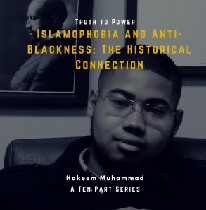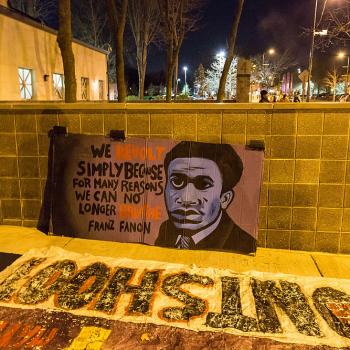“Brazil was repeatedly threatened by a series of Islamic uprising among black slaves.” – Dr. Dennis Walker.
In the first part of the series, Islamophobia and Anti-Blackness pt 1, we raised the question: what is the significance of Licutan, a Black Islamic scholar and one of the key masterminds behind the Islamic Slave Revolts of Brazil, proclaiming himself to be Bilal in the courtroom of his oppressors? To fully Licutan’s bold actions one must be cognizant of the anti-Black theology that has shaped modernity.
 White supremacy is a structure rooted in the ways Whiteness has attempted to elevate to the metaphysical level of God. Calvin Warren indicates that, “that anti-black political organization is often anchored in a racist theology—one that considers anti-blackness God’s will.” This was done through elevating “White western God-man” as an idol deity and expelling Blackness to the anti-human world, where the slave is put in a position to attain ontological recognition from the White master.
White supremacy is a structure rooted in the ways Whiteness has attempted to elevate to the metaphysical level of God. Calvin Warren indicates that, “that anti-black political organization is often anchored in a racist theology—one that considers anti-blackness God’s will.” This was done through elevating “White western God-man” as an idol deity and expelling Blackness to the anti-human world, where the slave is put in a position to attain ontological recognition from the White master.
In “Law as a Eurocentric Enterprise,” Kenneth Nunn indicates that the law served as a means for Europeans to legalize their atrocities and bolster their White self-image. Then, the judicial system that sought to prosecute Licutan was in fact an altar enabling the judges and prosecutors to worship white Western-God-man. In their idolatrous worldview, the enslavement of Black people was God’s will. The court room would have inevitably found Licutan guilty.
There was no defense that Licutan could have mounted that would have affirmed his right to rebel within the confines of the worldview that the court system was established upon. All Licutan could do was challenge the underlying anti-Black theology of the judicial system and Licutan’s affirmation of Bilal accomplished just that.
Who was Bilal?
In Islamic tradition, Bilal was a Black slave who would be brutally tortured for his embracing of Islam. While being subjected to inhumane torture, Bilal would simply repeat “A’had”, refusing to denounce his Islamic beliefs. Ahad denotes that Allah is one. It affirms that the purpose of creation is to be slaves of this one Creator and not slaves to any of the creation. The words of this Black slave ‘Ahad’ would become the battle cry utilized by the Muslim Army against the Jahaliya Arabs in the Battle of Badr. Later, the Prophet’s (pbuh) conquering of Mecca culminated in Bilal climbing on top of the Kaba, the holiest structure for Muslims and giving the call to prayer. It is said that Bilal left the enslavement of man and entered into servitude for God.
The Impact of Bilal on Black Slaves
The White slave masters sought to inculcate among Blacks that their only purpose in life was to be slaves to a White master. Resistance is only possible when one has a worldview to counter the prescriptions on life as taught by the slave master. Islam was such a liberatory theology. Islam through the story of Bilal provided slaves with the firm belief that they were to be slaves to no one but Allah. As a result, Islam gave Africans a theology to counter the White-Western God man and the various idols of anti-Blackness.
Historian Reis states Litcutan’s proclamation of Bilal meant that, “The revolt was still alive in Licutan’s or Bilal’s heart, despite its failure on the battlefield.” In calling himself Bilal, Licutan affirmed God’s oneness and symbolically subverted “White-Western God-Man”, the idol deity, which the court system had worshiped. Lictutan acknowledged a source of justice outside of the judicial system of his slave master and acknowledged God as the true judge, one that would judge the unethical world that he lived within and grant him true justice.
While historians conclude that the Male revolt was a failure, they look at it primary from a worldly perspective, whereas African Muslims were concerned with the hereafter. The eschatological beliefs of Islam were deeply relevant to African Muslim slaves who believed Islam was, “the best way to beat the white master, here or in the next world.” Though, Licutan would be given capital punishment for his role in the slave rebellion, Licutan was a man who believed in the Qu’ranic ayaat,” do not say about those who are killed in the way of Allah , “They are dead.” Rather, they are alive, but you perceive it not.” Licutan would not have believed that merely being given capital punishment would have meant his death or defeat, but possibly the chance for a greater life outside a cruel anti-Black world.
The Results of the Rebellion
In response to these revolts, Islam would be heavily repressed. Mosques secretly established by Black slaves would be hunted out and destroyed. Efforts to baptize Black slaves were increased and African Muslims would even be deported. Analyzing this reaction, Historian Shareef Bin Farid,” white Portuguese oppression of the African Muslims of Bahia was a paranoid reaction to a possible repeat of the glorious Moorish Muslim hegemony over Portugal and Spain.” This indicates that the Islamophobia that manifested in the slave system among White Europeans to be rooted in a factor which predated the Middle Passage. In the next article,”The Fall of Islamic Spain and the Birth of Modernity,” we will analyze these factors.
—












